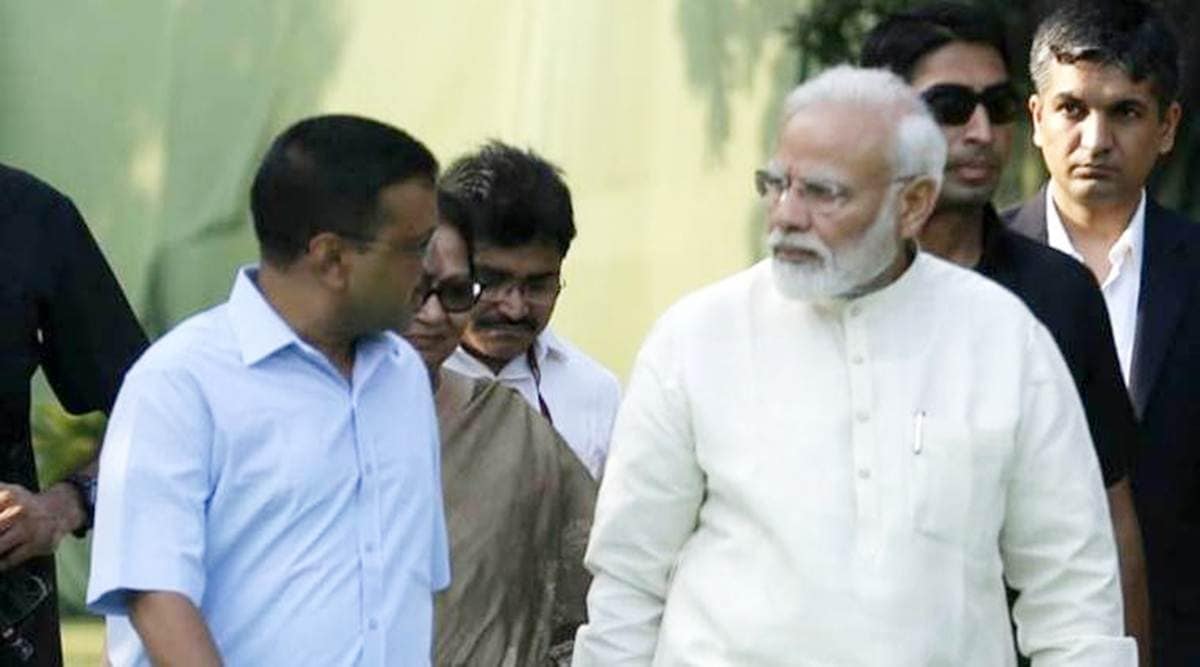 Chief Minister Arvind Kejriwal said the Bill was a way to curtail the powers of the state, and was against the order of the Supreme Court. (File)
Chief Minister Arvind Kejriwal said the Bill was a way to curtail the powers of the state, and was against the order of the Supreme Court. (File) The Centre on Monday introduced a Bill in Lok Sabha to bring amendments to the Act that decides the roles of the elected government and the nominated Lieutenant Governor in Delhi.
Delhi Deputy Chief Minister Manish Sisodia said that if the proposed amendments to The Government of National Capital Territory of Delhi Act, 1991 are passed, elections and the elected government in Delhi will become meaningless.
Officials said two proposed amendments, in particular, have the potential to render the elected government irrelevant.
One seeks to state clearly that the expression “government” will mean the Lieutenant Governor in laws made by the Legislative Assembly; the other says that the opinion of the L-G has to be sought for any executive action.
The Delhi government and Centre have been at loggerheads since the Aam Aadmi Party (AAP) came to power for the second time in 2015. One of the AAP’s biggest promises was to fight for full statehood for Delhi. While this has not been realised, and four areas – land, public order, police, and services – remain under the control of the L-G, the AAP had felt encouraged after a Constitution Bench of the Supreme Court ruled in 2018 that the L-G would be bound by the aid and advice of the Council of Ministers in matters that were not directly under the control of the L-G.
“The Centre has brought in Parliament an undemocratic and unconstitutional Bill. It says L-G is the government and all decisions and files have to be routed through him,” Sisodia said on Monday. “This Bill goes against what the Supreme Court Constitution Bench order had stated. If this is what the Centre wants to do, what is the point of holding elections and there being an elected government in the state? Why does the Centre pretend to be democratic?”
‘Will clarify ambiguities’
The Bill seeks to clarify the expression “Government”, which shall mean the L-G in context of legislation passed by the Assembly. This, it says, will be “consistent with the status of Delhi as a Union Territory” and will “address the ambiguities in the interpretation of legislative provisions”.
Sisodia alleged that the amendment Bill was a ploy by the Centre to incapacitate the Delhi government, which was working for the people.
“They (the BJP) lost elections in Delhi and could not buy MLAs like they do in other states, so they are using this tactic in Delhi,” he said.
Chief Minister Arvind Kejriwal said the Bill was a way to curtail the powers of the state, and was against the order of the Supreme Court.
“After being rejected by people of Delhi (8 seats in Assembly, 0 in MCD bypolls) BJP seeks to drastically curtail powers of elected government through a Bill in Lok Sabha today. Bill is contrary to Constitution Bench judgment. We strongly condemn BJP’s unconstitutional and anti-democracy move,” Kejriwal posted on Twitter.
The Government of National Capital Territory of Delhi (Amendment) Bill, 2021, introduced by Minister of State for Home G Kishan Reddy, proposes to amend four clauses of the 1991 Act.
The first is in Section 21, “Restrictions on laws passed by Legislative Assembly with respect to certain matters”. The Bill seeks to add a subsection making it clear that the “expression ‘Government’ referred to in any law to be made by the Legislative Assembly shall mean the Lieutenant Governor”.
The second amendment is sought in Section 24, which deals with assent to Bills passed by the Legislative Assembly. The amendment seeks to add that the L-G will not assent to and pass on to the President for consideration any Bill which “incidentally covers any of the matters which falls outside the purview of the powers conferred on the Legislative Assembly”.
Third, the Bill wants to add in Section 33 (“Rules of procedure”) that rules made by the Assembly for regulating its procedure and conduct of business shall not be “inconsistent with the Rules of Procedure and Conduct of Business in House of People”.
Also, “Provided that the Legislative Assembly shall not make any rule to enable itself or its Committees to consider the matters of day-to-day administration of the Capital or conduct inquiries in relation to the administrative decisions, and any of the rule made in contravention of this proviso, before the commencement of the Government of National Capital Territory of Delhi (Amendment) Act, 2021, shall be void.”
Section 44 (“Conduct of business”) of the 1991 Act says that “all executive action of the Lieutenant Governor whether taken on the advice of his Ministers or otherwise shall be expressed to be taken in the name of the Lieutenant Governor”. The amendment Bill seeks to add that before any executive action is taken in “pursuance of the decision of the Council of Ministers or a Minister” or to “exercise powers of the government”, the opinion of the L-G has to be obtained.
The Bill refers to clause (4) of Article 239AA of the Constitution, which states that there will be a Council of Ministers in Delhi to “aid and advise the Lieutenant Governor” and that in cases of difference of opinion between the L-G and the Ministers in making laws, the former will refer it to the President for a decision.
‘Will clarify ambiguities’
The Bill seeks to clarify the expression “Government”, which shall mean the L-G in context of legislation passed by the Assembly. This, it says, will be “consistent with the status of Delhi as a Union Territory” and will “address the ambiguities in the interpretation of legislative provisions”.